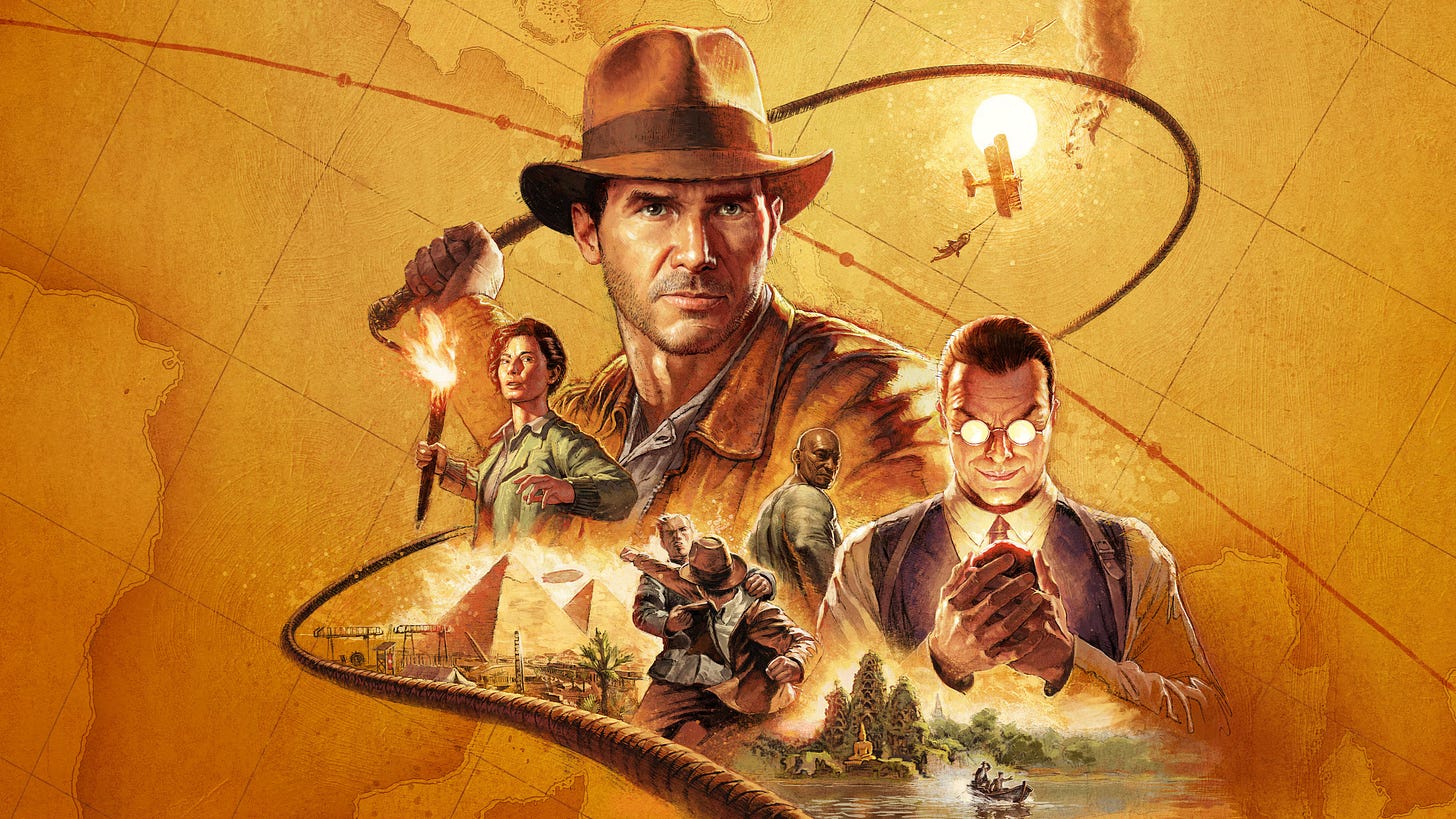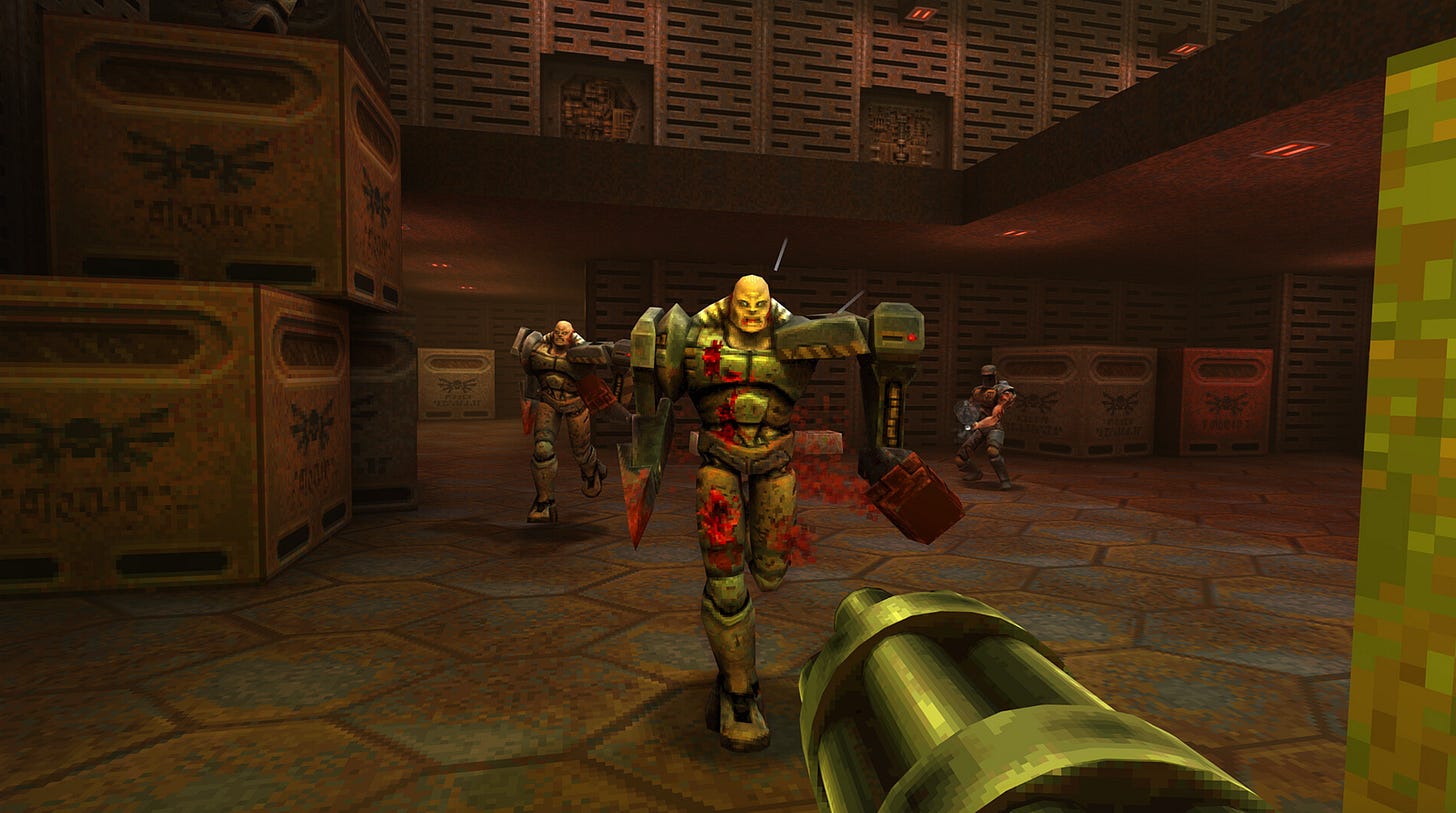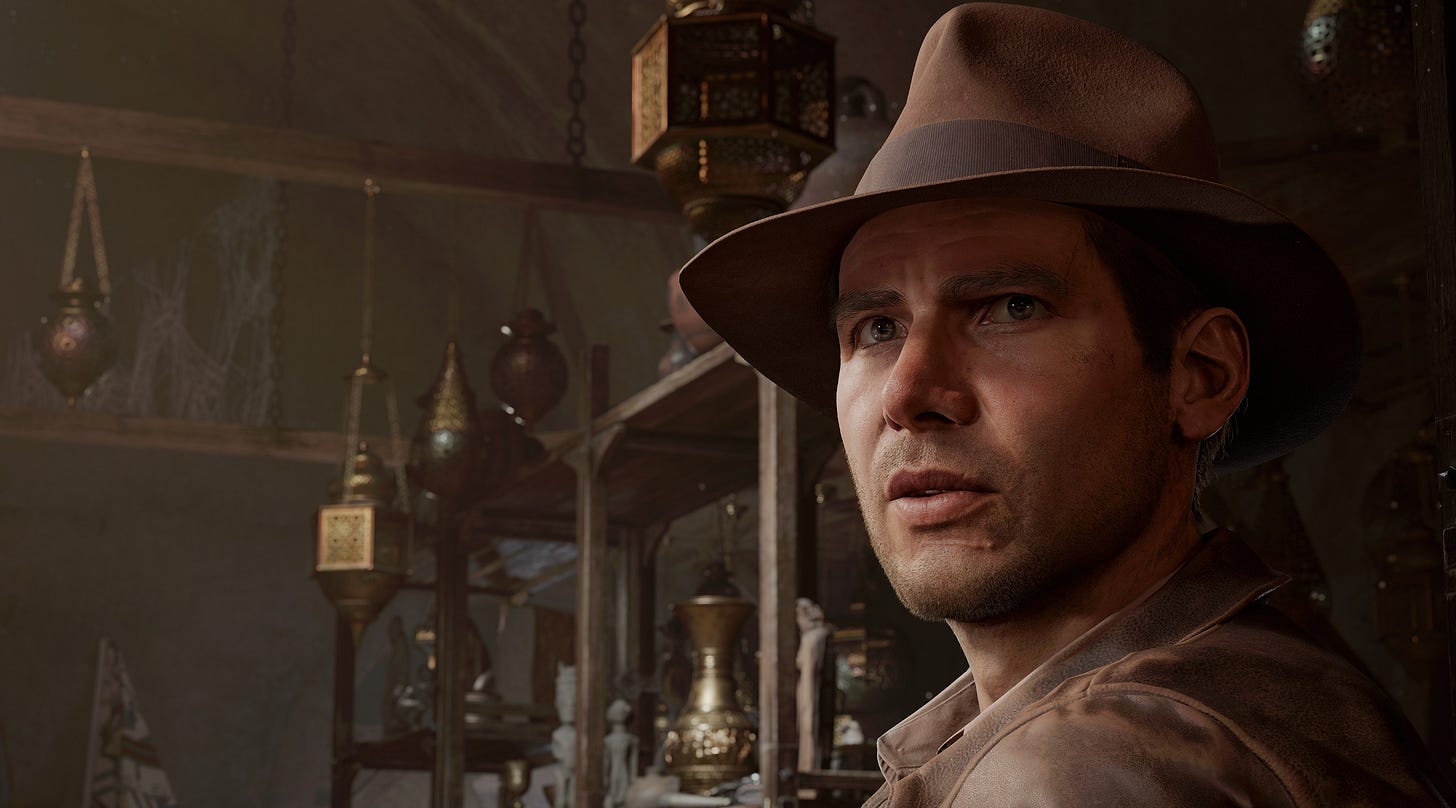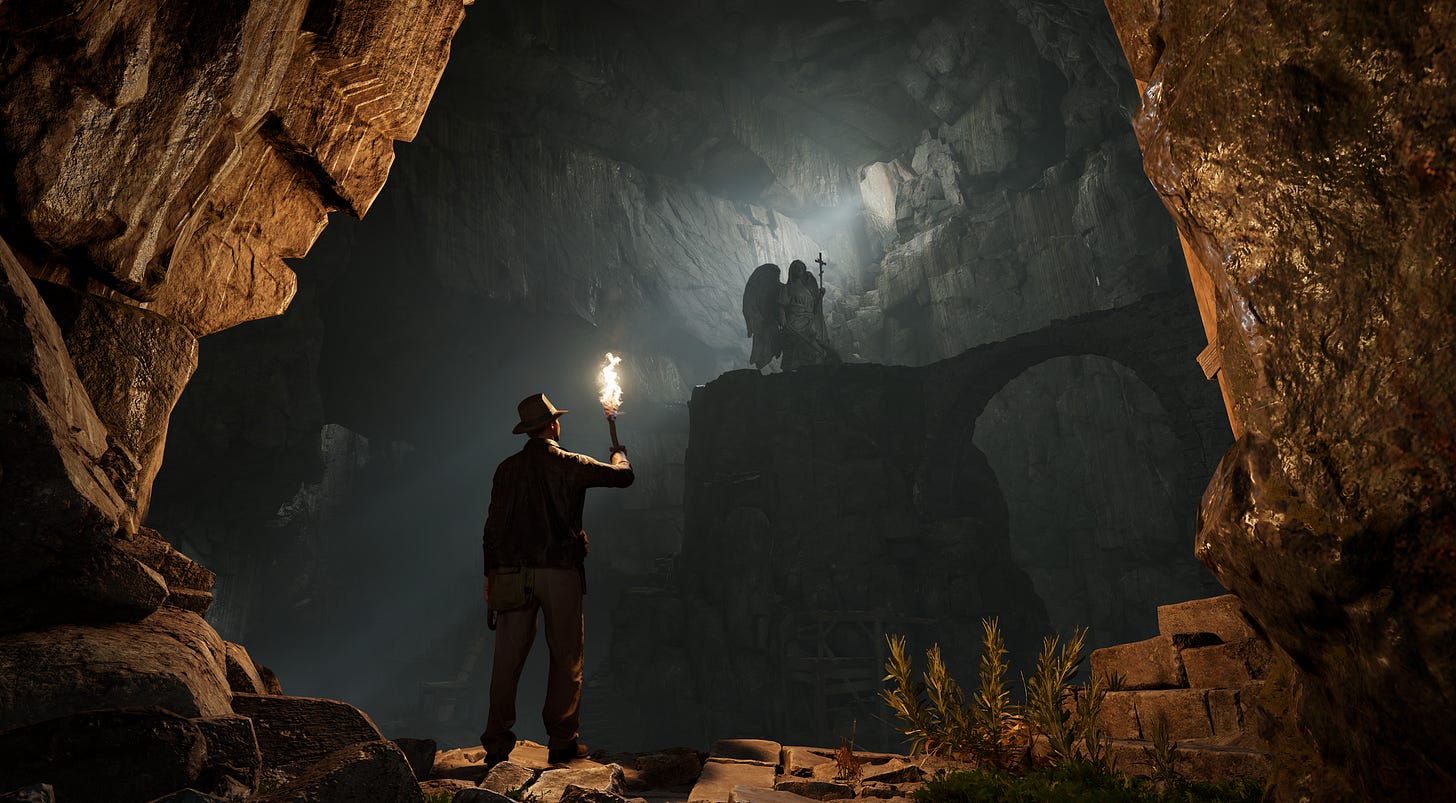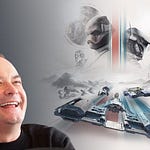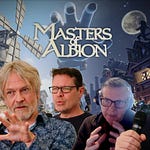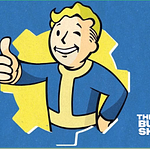Listen now on Apple, Spotify or YouTube
In This Edition
MachineGames on…
- Still making Quake levels
- First-person Indiana Jones
- Making games for Game Pass
- The studio’s unique culture
Hello! Welcome back. Before we kick-off today’s edition, I was wondering if you might be able to help me out? I’m trying to learn about you! I also want to hear your thoughts on what we’re doing, and ask some questions on what (if anything) you might consider paying for. If you have a few minutes, I’ve created a handy survey through here.
And now back to the today’s interview!
Jens Andersson has only gone and broken the first rule.
The design director on Indiana Jones and the Great Circle has been sharing with me what his team gets up to when they’re not making award-winning first-person adventure games.
“There is a fight club going on in the basement,” he begins. “Our animation director is Jujitsu, really high level, and he's been holding this thing where people can go down during lunch and get beaten up, more or less.
“There are a lot of hobbies at MachineGames. There are a lot of people who are into sports shooting. It’s a very nerdy culture. We have LEGO building Thursdays.”
Andersson is sitting next to audio director Pete Ward, so I had to ask…
“No, I haven't been down to the basement to get beaten up,” he answers. “We've been very busy on the game for the last couple of years. But I have members of the team who play Floorball, which is like indoor hockey. There's a bunch of those different sports. [We have] Swedish language learning as well, which I need to do more of. I’ve been living in Sweden for 10 years and I need to be better at it.
“These opportunities give people different disciplines and the opportunity to connect within and outside of work. They help foster better work relationships as well, because you know this level designer now because you've been talking Swedish with them, and then you can collaborate on something better.”
Quake origins
The reason I’m talking to MachineGames about its extracurricular activities is because I’ve always been curious about something that the studio does.
Over its 15-year history, the Swedish developer has built a reputation for making excellent first-person games. It began with rebooting the Wolfenstein series, before making the pivot to Indiana Jones last year.
But in between those, the studio has created expansions and mission packs for Quake and Doom. As in, the original Quake and Doom games from the 1990s. These titles have been remastered in recent years (by remaster specialist Nightdive Studios), and these new editions have come with additional levels created by MachineGames.
“I don't partake myself, but there's a proud tradition within the studio [with Quake],” Andersson explains. “Jerk Gustafsson, our game director and CEO, that's where he came from. He got into the industry by building Quake levels. That's when I started working with him as well. He was a level designer and he built Quake levels throughout the years [for fun]. Enough people like that have joined MachineGames. And these guys are crazy, because they work like hell on the games, as we all do, but then they go and do Quake maps. Because that is something that… I don’t know, they feel like they can control a little better? A pure game development thing.
“And of course within the Bethesda family, with the close collaboration with [Quake and Doom developer] id software, these opportunities arise. It cheers the rest of the studio to do this kind of stuff. It’s fun.”
So, these things are more like a hobby? Just a bit of fun?
“I definitely consider this a hobby,” Andersson says. “But it can go off the rails a bit. These campaigns they did for Quake 1 and 2… that was a lot of work that people put into them, and it started to compete with their day job. Because you need to ship, and that is always the hard part. But they want to consider it a hobby.”
Aiming older
As a 40-year-old, MachineGames’ titles appeal to me. This studio has spent its entire existence working on IP that dates back to the 1980s. Indiana Jones is an icon from my youth, whereas I can’t imagine there are many young Fortnite players who are that familiar with him.
From the outside, it looks like MachineGames has purposely identified an undeserved market of older games. But Andersson suggests it isn’t anything nearly as calculated.
“We're making the games that we would like to see and play,” he answers plainly. “And we are all getting pretty old at this point. Obviously, we want to make games that get played by as many people as possible. And the format is constantly evolving. The platform is constantly evolving. And we want to evolve with that. But we still are going to make the games that we would like to play.”
Game Pass considerations
That evolution includes the emergence of subscription services. Indiana Jones and the Great Circle launched, day one, into Xbox Game Pass. What’s more, it followed Call of Duty: Black Ops 6, which had delivered a significant spike in users for Game Pass the month before. As a result, Andersson was mindful that his game might have players who were unfamiliar with this type of experience.
“It’s a very difficult proposition,” Andersson says. “And for this game in particular, we also have to struggle with players who know who Indiana Jones is, and those who don't. There are a lot of kids out there who haven't seen the movies, and this is going to be their first introduction to the IP. So, we tried to make this the most accessible MachineGames game so far.
“As for Game Pass… We know the behavior of players. They jump in for five minutes and they drop out.”
“It's on Game Pass. There's going to be a lot of people trying this genre for the first time. It was very, very important to make the onboarding stronger and better than other titles. That was a big focus.
“As for Game Pass… We know the behavior of players. They jump in for five minutes and they drop out. You can take a certain amount of decisions based on that, but at the same time, you don't want to make too many concessions. It needs to be a great game for the player who plays all the way through. That's the most important part for us, being the story-centric studio as we are. It's a hard balance. You always know that you should worry about that more, but at the same time, you care about the grand scheme of things.”
MachineGames DNA
Wolfenstein, Quake, Doom, Indiana Jones… throughout its history, MachineGames has worked on established IP. And if you go back even further to Starbreeze (which was the developer that the MachineGames’ leadership team hailed from), you’ll discover other big licensed titles based on The Chronicles of Riddick.
But Andersson tells me not to read too much into that history of working on existing brands.
“The games you get to work on, there are so many reasons why those are the projects,” he says. “The projects we had back in Starbreeze were very much about what was available to us. We wanted to work on a video game and here’s the IP that someone is prepared to fund. With MachineGames starting off as part of Bethesda, picking an IP that is within the organization was a very smart decision. It allowed them to create their own thing while also having an established IP to build on top of. But [working on established brands] is not part of MachineGames’ DNA.”
I asked Andersson what he considers the “MachineGames DNA”, and it turns out the team explored exactly that when working on Indiana Jones. He says that MachineGames titles are about strong characters, a good story, and a variety of different environments and gameplay mechanics.
And, of course, the first-person perspective.
“A lot of people on the team have been working together for a very long time, and there is stuff that we collectively like, such as player agency and immersion,” Andersson says. “First-person as a perspective is something that we feel very strongly about and have iterated on all the way back since Chronicles of Riddick.”
Considering how iconic Indiana Jones is, creating a game where he’s often not on screen is quite the bold choice.
“We're not stupid. We knew it would be a controversial decision to take such an iconic character and make a first-person game,” Andersson says, before adding that the game does feature moments where the action switches to the third-person.
“We knew from previous games how to execute on that. We just refined and played with it a little bit. I think it's a very nice mix of perspectives. But the whole concept of the game is that you are Indiana Jones. First-person is perfect for that. You are seeing the world through his eyes.”
Of course, there’s more to Indiana Jones than just the man in a hat. There’s the whip, the revolvers, the boulders, and that famous Raiders music. And that’s all here. Ward’s team also spent time breaking guitars and smashing things with frying pans to recreate some of those classic comical sound effects from the films. It all made for a distinct Indiana Jones experience, even if you can’t always see the hero.
The next chapter
Lucasfilm/Disney pulled off quite a coup in having MachineGames build The Great Circle. There hasn’t been a successful Indiana Jones movie in over 35 years, and as a games franchise, it barely registers. I can only imagine how Bethesda/Microsoft must feel paying for the privilege of restoring the IP to some of its former glory.
But although that may be true from a business perspective, for MachineGames, Indiana Jones is a relevant franchise. And that’s important.
The developer has been producing stronger, more confident work with each new title. That’s been achieved by keeping hold of its key people, so they can build on the work they’ve done together on prior projects. There is more to keeping talent than good wages and benefits. It also requires doing things like supporting basement fight clubs, enabling staff to create Quake and Doom maps, and it means signing projects that matter to the team on a personal level.
Andersson and Ward tell me how much MachineGames has learnt while making The Great Circle (and its DLC, The Order of Giants, which launches this week). And just like it’s always done, the studio will put those lessons to use on whatever comes next.
“We've built a huge amount of extra technology and improved technology. We've brought up lots of experience within the team,” says Ward. “And I'm looking forward to taking that experience in how to work together, and how to work with the technology, and making the next game even better than this one. We are starting from a much different position now.
“You saw a lot of churn during the pandemic. I always think the biggest problem with that was teams sticking together and developing the technology and knowing how each other work. You can never put a price on that because each new game can benefit from it.”
Andersson concludes: “There are so many things we did for the first time on The Great Circle. We rebuilt the engine from the ground up, expanded our vocabulary of features… exploration, semi-open world areas, a lot of new tech… as Pete says, we are in a much, much better position today.”
Sponsor Message
Green Man Gaming on Gaming for Good
Green Man Gaming is creating new revenue streams and discoverability options that will help businesses extend games’ lifecycle and grow their audience.
It recently revealed its Charity Bundles platform: a curated way for publishers to reach new audiences, generate incremental revenue, and support causes that matter. The platform offers transparent stock levels, instant key fulfilment, and regional pricing - all while raising funds for charities like SpecialEffect’s One Special Day. Get involved at: www.greenmangaming.com/company/charity-bundles.
Elsewhere, Green Man Gaming Distribution is a new service that helps studios boost discoverability by activating titles across 180+ vetted retailers, reaching over 100m gamers and delivering up to 20 - 30% more revenue compared to Steam-only sales.
You’ve made it! We will be back on Thursday where we will be diving into the state of the video game jobs market. Until then, thank you for reading!



